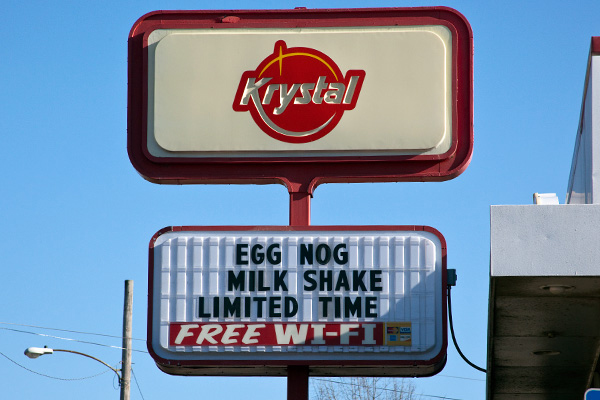 I’m in my hometown of Memphis, Tennessee for Christmas and on a drive between Memphis and Nashville I noticed that every $30/night hotel offered free wireless Internet access. Further, when we got to Nashville and checked into the relatively low-frills Holiday Inn Express we had better wireless Internet access than I’ve had in hotels around the US and the world—some of which I paid double to stay in.
I’m in my hometown of Memphis, Tennessee for Christmas and on a drive between Memphis and Nashville I noticed that every $30/night hotel offered free wireless Internet access. Further, when we got to Nashville and checked into the relatively low-frills Holiday Inn Express we had better wireless Internet access than I’ve had in hotels around the US and the world—some of which I paid double to stay in.
What gives with hotel WiFi?
This is a ten-year-old technology that has improved in speed and quality nearly everywhere—in homes, in offices, in public spaces, in coffee shops, in airports—even on planes. You can even get free WiFi at Krystal, a fast food chain that’s on par with White Castle and sells hamburgers for less than $1 each. Over the past two years I’ve stayed at more than two-dozen hotels around the United States and the emerging world. I’ve noticed a trend that seems to fly in the face of basic economics and technology adoption: The pricier and fancier hotel, generally the worse quality the WiFi, if it exists at all.
On a trip to Boston two years ago my fancy downtown, five-star hotel had no wireless access. The brand new W in Santiago, Chile has no wireless access. In India, Rwanda and Argentina I’ve had to buy expensive 24-hour WiFi passes, which can add up to hundreds of dollars per stay, for a connection that was just OK. But I knew better than to complain: The quality of the connection is almost always better in emerging markets than Western Europe.
London is hands-down the worst: I’ve stayed at the Sanderson in London twice and always had a hard time getting online, and I’ve also stayed at the Malmaison where even the wired connection didn’t work. I had to go down to the lobby to get a signal. Even then it was like the early days of wireless where you wandered around holding your laptop looking for bars like you were panning for gold.
Arrington may have his silly germaphobe, fist-bump movement. MG may be determined to hold AT&T accountable for its embarrassingly bad iPhone service. Here’s my outrage: Why in 2010 do so many hotels have zero, unreliable or outrageously expensive wireless Internet access?
This is clearly not a cost issue when economy hotels like Holiday Inn and Days Inn have no problem offering free wireless access from the middle of nowhere in the South. (Not to mention Krystal.) This is an issue of greed or tech ignorance on the part of luxury hotels and consumers and business travelers need to start showing some outrage.
On the greed point, Paul Carr—whose parents are hoteliers and lives in hotels now—says the sky-high prices are largely the result of hotels losing fees from business travelers making phone calls, now that we all have mobile phones. The only way to make up the cost was to start charging for Internet access. I wouldn’t have a huge problem with that if the access was good. But I get angry when you charge me $20 a day for a connection that barely works when I can get a better connection at a coffee shop next door for free.
Why not do what the Royal Orchid in Bangalore does? They offer a basic connection for free, and offer a paid rate if you want a faster speed. That still allows a way for the hotel to make money off business travelers with expense accounts, gives guests who need a high-speed connection an in-room option and offers price-conscious guests a way to do the basics like checking email for free.
The other issue is technology. A lot of hotels—deeming themselves too tech-ignorant to install and manage wifi networks themselves—entered into pricey service relationships with third party providers. Hotels say it’s those providers who saddle us with the high fees, and in my experience, not very good connectivity.
If hotels feel they absolutely can’t manage these networks themselves, there have to be better options. What about big Web portals and search engines like Yahoo and Google, or for other countries the local equivalents? Google was ready to wire up all of San Francisco for free access in exchange for ad placement and a Google start page, why not do that for, say, a chain of boutique luxury hotels instead? Or at a minimum, outsource to a service like Boingo that is pretty consistent in service and that many travelers already have a subscription for anyway. It makes the fees hurt less when you can buy an annual pass that’s also good at coffee shops, airports and other public spaces.
These are just a few ideas, and no doubt those of you with more experience setting up networks for big spaces have more. The Internet is fully woven into our lives now. It is the primary way people stay in touch, work and entertain themselves. There is no reason we shouldn’t expect a decent—and preferably free—connection when we pay upwards of $150/night for a hotel if a $30/night hotel can offer it. I, for one, would forgo the pillow mints, free HBO and mini-shampoos if that helps with the margins.